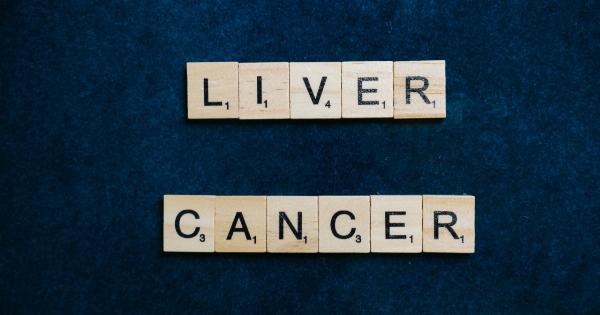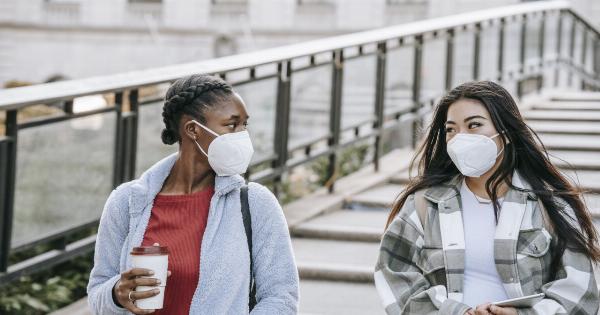Liver cancer is a type of cancer that begins in the cells of the liver. It is a serious and potentially life-threatening condition that often goes undetected until it reaches an advanced stage.
Liver cancer can be difficult to treat, and the prognosis is often poor. In this article, we will explore the danger of liver cancer, its causes, symptoms, diagnosis, and treatment options.
Causes of liver cancer
Liver cancer can have various causes, including:.
1. Chronic viral hepatitis: Chronic infection with hepatitis B or C virus increases the risk of developing liver cancer.
2. Alcohol-related liver disease: Excessive alcohol consumption can lead to liver cirrhosis, which puts individuals at a higher risk of developing liver cancer.
3. Non-alcoholic fatty liver disease (NAFLD): NAFLD is often associated with obesity, diabetes, and metabolic syndrome. It can progress to liver cirrhosis and eventually increase the risk of liver cancer.
4. Cirrhosis: Cirrhosis is a late stage of scarring (fibrosis) of the liver caused by many forms of liver diseases and conditions, such as hepatitis and chronic alcoholism. Cirrhosis increases the risk of liver cancer.
5. Exposure to aflatoxins: Aflatoxins are toxic substances produced by certain types of fungi. They can contaminate crops such as peanuts and corn, and long-term exposure to aflatoxins can increase the risk of liver cancer.
Symptoms of liver cancer
The symptoms of liver cancer may vary depending on the stage of the disease. Early-stage liver cancer often does not cause any noticeable symptoms. As the cancer progresses, the following symptoms may occur:.
1. Unexplained weight loss.
2. Loss of appetite.
3. Abdominal pain or swelling.
4. Jaundice (yellowing of the skin and eyes).
5. Fatigue and weakness.
6. Nausea and vomiting.
7. White, chalky stools.
These symptoms can also be caused by other conditions, so it is important to consult a healthcare professional for an accurate diagnosis.
Diagnosis of liver cancer
If liver cancer is suspected, a doctor may recommend several diagnostic tests, including:.
1. Blood tests: Blood tests can help evaluate liver function and detect markers of liver cancer, such as alpha-fetoprotein (AFP).
2. Imaging tests: Imaging tests, such as ultrasound, CT scan, or MRI, can provide detailed pictures of the liver and help identify any tumors.
3. Biopsy: A biopsy involves the removal of a small sample of liver tissue for examination under a microscope. It is the most definitive way to diagnose liver cancer.
4. Laparoscopy: In some cases, a laparoscopy may be performed to directly visualize the liver and collect tissue samples.
Treatment options for liver cancer
The treatment options for liver cancer depend on the stage of the disease, overall health of the patient, and other factors. Some common treatment modalities for liver cancer include:.
1. Surgery: Surgical removal of the tumor and surrounding healthy tissue may be an option for early-stage liver cancer. In some cases, a liver transplant may be recommended.
2. Radiation therapy: This treatment uses high-energy beams to kill cancer cells. It may be used before or after surgery, or as a palliative treatment to relieve symptoms.
3. Chemotherapy: Chemotherapy uses drugs to kill cancer cells. It can be administered orally, intravenously, or directly into the liver.
4. Targeted drug therapy: Targeted therapies are designed to specifically target cancer cells while sparing healthy cells. They may be used in advanced liver cancer cases.
5. Immunotherapy: Immunotherapy uses the body’s immune system to fight cancer. It is a newer approach and may be used in specific cases of liver cancer.
Prevention of liver cancer
Although not all cases of liver cancer can be prevented, certain measures can help reduce the risk. These include:.
1. Vaccination: Vaccination against hepatitis B can significantly reduce the risk of developing liver cancer.
2. Safe sex practices: Practicing safe sex and avoiding high-risk behaviors can help prevent hepatitis B and C, which are major risk factors for liver cancer.
3. Moderating alcohol consumption: Limiting alcohol intake can help reduce the risk of developing liver cirrhosis and subsequently liver cancer.
4. Healthy lifestyle choices: Maintaining a healthy weight, eating a balanced diet, and exercising regularly can help prevent non-alcoholic fatty liver disease and obesity-related liver cancer.
Living with liver cancer
Living with liver cancer can be challenging, both physically and emotionally. It is important for individuals with liver cancer to seek support from healthcare professionals, support groups, and loved ones.
Palliative care can also play a crucial role in managing symptoms and improving quality of life.
Regular follow-up appointments and adherence to treatment plans are essential for monitoring disease progression and optimizing outcomes. It is crucial to discuss any concerns or changes in symptoms with a healthcare provider.
Conclusion
Liver cancer is a dangerous and complex disease that requires early detection and appropriate treatment for better outcomes. Understanding the causes, symptoms, and treatment options can help individuals make informed decisions about their health.
Moreover, focusing on prevention by adopting a healthy lifestyle and getting vaccinated against hepatitis B can significantly reduce the risk of developing liver cancer. By raising awareness and promoting early diagnosis, we can save lives and mitigate the dangers associated with liver cancer.





























